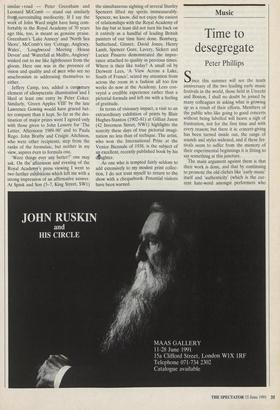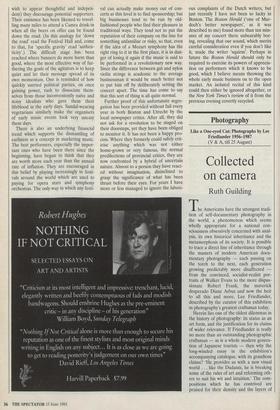Music
Time to desegregate
Peter Phillips
Since this summer will see the tenth anniversary of the two leading early music festivals in the world, those held in Utrecht and Boston, I shall no doubt be joined by many colleagues in asking what is growing up as a result of their efforts. Members of the public who like going to good concerts without being labelled will heave a sigh of frustration, not for the first time and with every reason; but there it is: concert-giving has been turned inside out, the range of sounds and styles widened, and if these fes- tivals seem to suffer from the memory of their experimental beginnings it is fitting to say something at this juncture.
The main argument against them is that their work is done, and that by continuing to promote the old clichés like 'early music' itself and 'authenticity' (which is the cur- rent hate-word amongst performers who wish to appear thoughtful and indepen- dent) they discourage potential supporters. Their existence has been likened to travel- ling many miles to attend a Camra drink-in when all the beers on offer can be found down the road. (In this analogy for 'down the road' read the Festival Hall and, come to that, for 'specific gravity' read 'authen- ticity'.) The difficult stage has been reached where banners do more harm than good, where the most effective way of fur- thering the goals of the agitators is to keep quiet and let their message spread of its own momentum. One is reminded of how quickly untried political parties, on once gaining power, rush to dissociate them- selves from those inconveniently naïve and noisy idealists who gave them their lifeblood in the early days. Sandal-wearing vegetarians similarly make the organisers of early music events look very uneasy these days.
There is also an underlying financial trend which supports the dismantling of earliness as a concept in marketing music. The best performers, especially the impor- tant ones who have been there since the beginning, have begun to think that they are worth more each year than the annual rate of inflation. They are encouraged in this belief by playing increasingly in festi- vals around the world which are used to paying for opera stars and symphony orchestras. The only way in which any festi- val can actually make money out of con- certs at this level is to find sponsorship; but big businesses tend to be run by old- fashioned people who find their pleasure in traditional ways. They tend not to put the reputation of their company on the line for something unfamiliar or risky, so that, even if the idea of a Mozart symphony has the right ring to it in the first place, it is in dan- ger of losing it again if the music is said to be performed in a revolutionary new way. Since the difference between gut and nylon violin strings is academic to the average businessman it would be much better not to put him off by deliberately setting the concert apart. The time has come to say that this sort of thing is all quite normal.
Further proof of this unfortunate segre- gation has been provided without fail every year in both Boston and Utrecht by the local newspaper critics. After all, they did not ask for a revolution to be staged on their doorsteps, yet they have been obliged to monitor it. It has not been a happy pro- cess. Where they formerly could safely crit- icise anything which was not either home-grown or very famous, the normal predilections of provincial critics, they are now confronted by a hybrid of uncertain nature. Almost to a person they have react- ed without imagination, disinclined to grasp the significance of what has been thrust before their eyes. For years I have more or less managed to ignore the labori- ous complaints of the Dutch writers, but just recently I have not been so lucky in Boston. The Boston Herald Cone of Mur- doch's better newspapers', as it was described to me) found more than ten min- utes of my concert there unbearably bor- ing, revealing that our sound, which merits careful consideration even if you don't like it, made the writer 'squirm'. Perhaps in future the Boston Herald should only be required to exercise its powers of apprecia- tion on performers which it knows to be good, which I believe means throwing the whole early music business on to the open market. An isolated recital of this kind could then either be ignored altogether, or the New York Times's review of it from the previous evening covertly recycled.



















































 Previous page
Previous page